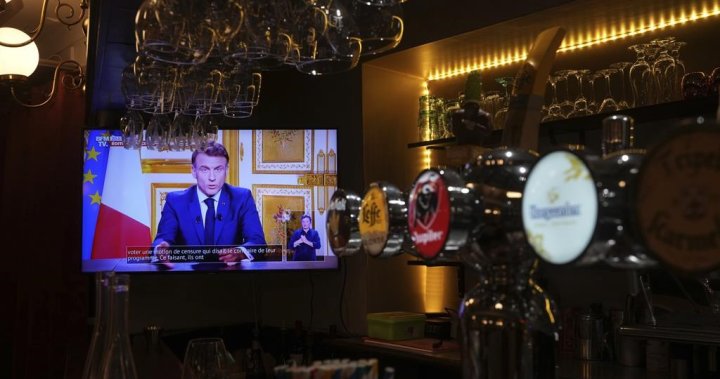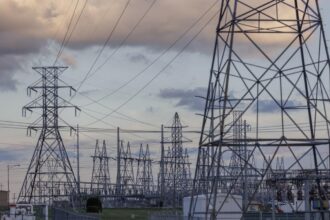French President Emmanuel Macron pledged Thursday to remain in office until the end of his mandate, scheduled for 2027, and announced that he would appoint a new prime minister within days in a bid to break the political impasse following the resignation of deposed Prime Minister Michel Barnier.
Macron fought the day after a historic no-confidence vote sparked by budgetary conflicts on the left of the National Assembly. France without a functioning government. He blamed his far-right opponents for the fall of the Barnier government.
“They chose disorder,” he said.
The president said the far right and far left had united in what he called “an anti-Republican front” and stressed: “I will not take responsibility for the irresponsibility of others.”
He said he would appoint a new prime minister within days, but gave no indication of who he would be.
Earlier in the day, Macron “took note” of Barnier’s resignation after just three months in office – the shortest term of any prime minister in modern French history.
Macron recognizes his own responsibility
While criticizing his political opponents, Macron also acknowledged what he described as his own responsibility for the chaos currently shaking French politics and worrying financial markets.
He reversed his June decision to dissolve Parliament. This precipitated the crisis, leading to legislative elections that produced a parliament now without a majority, divided between three minority blocs that do not have enough seats to govern alone.
“I recognize that this decision was not understood. Many criticized me for this,” Macron said. However, he maintained, “I believe it was necessary” to let French voters speak.

The next priority is to pass a finance law
Macron said the new prime minister “will be responsible for forming a government of general interest.”
He confirmed that special legislation will be introduced by mid-December to allow the state to collect taxes starting Jan. 1, based on this year's rules, and avoid a shutdown.

Receive national news daily
Get the day's top news, politics, business and current affairs headlines delivered to your inbox once a day.
“Public services will be operational, businesses will be able to work,” he said.
The new government will then prepare a finance law for 2025, which will allow France to invest as planned in its army, justice and police – and also support struggling farmers, Macron said.
How to achieve the “impossible”
In addition to his own domestic political and financial difficulties – notably France's growing debt levels – Macron stressed that the country faced multiple international challenges, citing the wars in Ukraine and the Middle East.
He returned to the Paris Olympic Games in July-August and the reopening of Notre-Dame Cathedral this weekend, affirming that France can emerge from this latest political crisis if it thinks about it.
“It’s proof that we know how to do great things, that we know how to achieve the impossible,” he said.
“Twice this year the world admired us for this,” he said, referring to the hosting of the Olympics and the restoration of Notre Dame. “Well, for the sake of the nation, we have to do the same thing.”
Macron faces the crucial task of appointing a replacement for Barnier, capable of leading a minority government in a parliament where no party holds a majority. Yaël Braun-Pivet, president of the National Assembly and a member of Macron's party, urged the president to act quickly.
“I recommend that he quickly choose a new Prime Minister,” Braun-Pivet said Thursday on France Inter. “There must be no political hesitation. We need a leader who can talk to everyone and work to pass a new budget bill.
The process can be difficult. French media have reported a shortlist of centrist candidates likely to appeal to both sides of the political spectrum.
Macron calls for resignation
The no-confidence vote galvanized opposition leaders, with some explicitly calling for Macron to resign.
“I believe that stability requires the departure of the President of the Republic,” declared Wednesday evening on BFM TV Manuel Bompard, leader of the far-left party La France Insoumise.

The far-right leader of the National Rally, Marine Le Pen, whose party holds the most seats in the Assembly, did not call for Macron's resignation but warned that “the pressure on the President of the Republic will become stronger and stronger.
The French Constitution does not require the resignation of a president after his government has been overthrown by the National Assembly. It also indicates that new legislative elections cannot take place until at least July, which could create an impasse for policy makers.
Economic uncertainty threatens
Political instability has increased concerns about the French economy, particularly its debt, which could reach 7% of GDP next year without significant reforms.
Analysts estimate that the fall of the Barnier government could raise French interest rates, further increasing the debt.
Ratings agency Moody's warned Wednesday evening that the fall of the government “reduces the likelihood of consolidating public finances” and worsens the political impasse.
Teachers' protest takes on a political tone
A planned protest by teachers against education budget cuts took on a new tone Thursday, as demonstrators in Paris linked their demands to the political crisis.
“Macron resigns! » » read a sign held by Dylan Quenon, a 28-year-old teacher at a college in Aubervilliers, just north of Paris.
Quenon said Macron bore responsibility for what he described as the dismantling of public services such as schools. “The only way for this to change is to get him out of office,” he said.
Protesters expressed little hope that Macron's next appointee would reverse course.
“I am happy that this government is falling, but it could lead to something even worse,” said Élise De La Gorce, a 33-year-old teacher in Stains, north of Paris.
#overthrow #French #government #Macron #appoint #Prime #Minister #National
World,Emmanuel Macron,France,France prime minister,French politics ,














